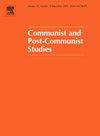乌克兰的选举、继承和合法性
IF 1.3
4区 社会学
Q3 INTERNATIONAL RELATIONS
引用次数: 0
摘要
在乌克兰的六次总统过渡中,只有2010年和2019年的过渡完全按照宪法的设想进行。在一些情况下,选举和过渡是为处理政治危机而作出的特别安排造成的。在一个案例中,街头抗议迫使被视为舞弊的选举重新进行,而在另一个案例中,街头抗议导致一位选举被视为自由公正的总统下台。在某些情况下,完全临时制定的程序被广泛认为是合法的,而在其他情况下,既定的正式程序不足以使领导人的统治合法化。这就提出了选举和合法性如何相互作用的问题。在什么条件下选举足以使统治合法化,在什么情况下选举是不够的?在什么情况下,非合法的改变统治者的手段会获得民众的合法性?通过回顾乌克兰的七次总统选举和六次权力过渡,本文探讨了选举作为合法力量的权力变化。本文章由计算机程序翻译,如有差异,请以英文原文为准。
Elections, Succession, and Legitimacy in Ukraine
Of Ukraine’s six presidential transitions, only those in 2010 and 2019 proceeded entirely as envisioned in the constitution. In several cases, elections and transitions resulted from ad hoc arrangements made to address political crises. In one case, street protests forced the rerunning of elections seen as rigged, and in another street protests led to the departure of a president whose election had been seen as free and fair. In some cases, procedures that were entirely improvised were widely seen as legitimate, while in other cases established formal procedures were insufficient to legitimize a leader’s rule. This raises the question of how elections and legitimacy interact. Under what conditions are elections sufficient to legitimate rule, and in what cases are they insufficient? Under what circumstances do non-legal means of changing rulers gain popular legitimacy? By reviewing Ukraine’s seven presidential elections and six transitions of power, this article explores variation in the power of elections as a legitimating force.
求助全文
通过发布文献求助,成功后即可免费获取论文全文。
去求助
来源期刊

Communist and Post-Communist Studies
Multiple-
CiteScore
1.90
自引率
0.00%
发文量
23
期刊介绍:
Communist and Post-Communist Studies is an international journal covering all communist and post-communist states and communist movements, including both their domestic policies and their international relations. It is focused on the analysis of historical as well as current developments in the communist and post-communist world, including ideology, economy and society. It also aims to provide comparative foci on a given subject by inviting comments of a comparative character from scholars specializing in the same subject matter but in different countries.
 求助内容:
求助内容: 应助结果提醒方式:
应助结果提醒方式:


